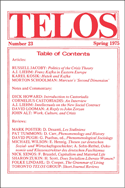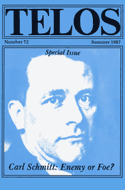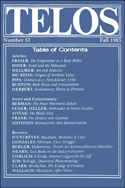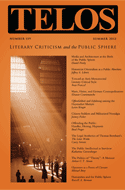By Giuseppina Mecchia · Wednesday, December 23, 2015 Reading the latest novel by Michel Houellebecq, I remembered an essay by Maurice Blanchot that appeared in 1964, entitled “L’Apocalypse déçoit,” roughly translatable as “The Apocalypse Disappoints.” Originally devoted to the intellectual failure on the part of the French intelligentsia to deal with the possibility of nuclear annihilation, the title of that essay seems the perfect commentary to a plot that would sound nothing less than apocalyptic to a very sizable part of contemporary French society: the election of a Muslim president of the French Republic and the Islamization of its civil code. This disastrous occurrence, currently treated in the Western media as nothing less than a catastrophic finis Europae, is narrated by Houellebecq in his increasingly understated voice, now mostly situated halfway between deadpan satire, melancholic brooding, and a touch of occasional melodrama. Gone are the violent Islamic terrorists of Plateforme, the 2001 novel that ended with terrorist attack on European sexual tourists in Thailand. No more spectacular explosions of the 9/11 kind: if the Western way of life will go, it won’t be with a bang, but with a merely audible whimper.
Continue reading →
By Michael Allan · Friday, December 11, 2015 For scholars of religion and literature, Michel Houellebecq’s Submission glimmers like a shiny lure. The storyline contains the sorts of details that appeal to an easy and seductive journalistic gloss. The year is 2022. A charismatic Muslim prime minister is elected in France, and an almost caricatured series of events follows: men and women are separated; the university president converts to Islam and weds a young wife; professors are coerced to convert or retire early; and so on. Add to the plot Houellebecq’s professed Islamophobia and the massacre at Charlie Hebdo, and you have the ingredients of a newsworthy book to be addressed by critics, journalists, and readers across the world. Like a number of reviewers, I initially found myself lured to consider religion, secularism, and contemporary French politics against the backdrop of the newly published English translation. But as I began reading, I was confronted with a challenge of a different sort.
Continue reading →
By Johanna K. Schenner · Wednesday, September 17, 2014  In “Franz Kafka in Eastern Europe,” Antonin J. Liehm addresses the impact of Kafka on both the communist literary sphere and the regime following the May 1963 Liblice Conference, an international symposium dealing with Kafka’s life and work. At first glance, this symposium does not appear to be remarkable: Kafka, known for such works as “The Metamorphosis” (1915) and “The Castle” (1926), was born in Prague in 1883, and he worked there as a lawyer before dying in 1924 in the sanatorium at Kierling, located in Klosterneuburg, Austria. Nonetheless, the symposium revealed that the socialist regimes were less totalitarian than supposed, if only for a short time, and it also attributed to Kafka a significant role in the beginning of cultural democratization, which then spread to other spheres. In “Franz Kafka in Eastern Europe,” Antonin J. Liehm addresses the impact of Kafka on both the communist literary sphere and the regime following the May 1963 Liblice Conference, an international symposium dealing with Kafka’s life and work. At first glance, this symposium does not appear to be remarkable: Kafka, known for such works as “The Metamorphosis” (1915) and “The Castle” (1926), was born in Prague in 1883, and he worked there as a lawyer before dying in 1924 in the sanatorium at Kierling, located in Klosterneuburg, Austria. Nonetheless, the symposium revealed that the socialist regimes were less totalitarian than supposed, if only for a short time, and it also attributed to Kafka a significant role in the beginning of cultural democratization, which then spread to other spheres.
Continue reading →
By Linas Jokubaitis · Tuesday, July 15, 2014  In “The Source of the Tragic,” Carl Schmitt developed an original interpretation of The Tragedy of Hamlet, Prince of Denmark rooted in his sociological understanding of the relationship between art and contemporary politics in Shakespeare’s tragedy. According to the German jurist, one can fully understand and appreciate this masterpiece only by taking into consideration the concrete political situation at the end of the reign of the Tudor dynasty and the intense struggles for legitimacy and authority in which Shakespeare created his theatrical works. In “The Source of the Tragic,” Carl Schmitt developed an original interpretation of The Tragedy of Hamlet, Prince of Denmark rooted in his sociological understanding of the relationship between art and contemporary politics in Shakespeare’s tragedy. According to the German jurist, one can fully understand and appreciate this masterpiece only by taking into consideration the concrete political situation at the end of the reign of the Tudor dynasty and the intense struggles for legitimacy and authority in which Shakespeare created his theatrical works.
Continue reading →
By Matt Applegate · Tuesday, May 6, 2014 As an occasional feature on TELOSscope, we highlight a past Telos article whose critical insights continue to illuminate our thinking and challenge our assumptions. Today, Matt Applegate looks at Arshi Pipa’s “Gramsci as a (Non) Literary Critic” from Telos 57 (Fall 1983).
 Arshi Pipa’s “Gramsci as a (Non) Literary Critic” is more than a short biography and description of Antonio Gramsci’s inquiries into literary criticism. It also provokes the reader to meditate on the political conditions of literary criticism as an intellectual practice. Gramsci is a controversial figure in the history of literary criticism for at least two reasons, according to Pipa. First, his political work remains more prominent than his literary criticism. When one thinks of Gramsci as a writer and historical figure, his literary criticism might not even register, given his political writing and influence. Second, Gramsci’s politics serve as the impetus for his intellectual projects, thus also providing potential grounds to dismiss or ignore his aesthetic analyses. To be sure, Gramsci is a controversial political figure. In 1921 Gramsci co-founded and led the Communist Party of Italy in opposition to fascism, and was later arrested by fascist police under Mussolini, ultimately dying in prison in 1937. Perhaps his most famous collection of writings, Prison Notebooks, was completed while he was incarcerated between 1926 and 1937. Yet, it is precisely Gramsci’s controversial style and political will that draw Pipa to his work and allow him to question literary criticism as an enduring intellectual practice. Arshi Pipa’s “Gramsci as a (Non) Literary Critic” is more than a short biography and description of Antonio Gramsci’s inquiries into literary criticism. It also provokes the reader to meditate on the political conditions of literary criticism as an intellectual practice. Gramsci is a controversial figure in the history of literary criticism for at least two reasons, according to Pipa. First, his political work remains more prominent than his literary criticism. When one thinks of Gramsci as a writer and historical figure, his literary criticism might not even register, given his political writing and influence. Second, Gramsci’s politics serve as the impetus for his intellectual projects, thus also providing potential grounds to dismiss or ignore his aesthetic analyses. To be sure, Gramsci is a controversial political figure. In 1921 Gramsci co-founded and led the Communist Party of Italy in opposition to fascism, and was later arrested by fascist police under Mussolini, ultimately dying in prison in 1937. Perhaps his most famous collection of writings, Prison Notebooks, was completed while he was incarcerated between 1926 and 1937. Yet, it is precisely Gramsci’s controversial style and political will that draw Pipa to his work and allow him to question literary criticism as an enduring intellectual practice.
Continue reading →
By Sean Franzel · Thursday, July 19, 2012 Sean Franzel’s “Toward an Anti-Monumental Literary-Critical Style: Notes on Benjamin and Jean Paul” appears in Telos 159 (Summer 2012). Read the full version online at the Telos Online website, or purchase a print copy of the issue here.
 This essay— modest notes rather than a systematic exploration of the problem of critical style— examines certain striking similarities between the critical vocabularies of Jean Paul and Walter Benjamin. In rejecting heroic conceptions of individual authorship, both writers treat the personal lives of literary figures as phenomena of larger significance, and both seek to undermine metaphors of monumentality. Through readings of Jean Paul’s 1804 Vorschule der Ästhetik (School of Aesthetics) and Benjamin’s pseudonymously published 1936 anthology Deutsche Menschen (German Men and Women), this essay argues that both writers remind us of the decidedly human sides of literary and critical life: of the weaknesses and limitations of this life, that is to say, as well as its potential for ethical direction. This essay— modest notes rather than a systematic exploration of the problem of critical style— examines certain striking similarities between the critical vocabularies of Jean Paul and Walter Benjamin. In rejecting heroic conceptions of individual authorship, both writers treat the personal lives of literary figures as phenomena of larger significance, and both seek to undermine metaphors of monumentality. Through readings of Jean Paul’s 1804 Vorschule der Ästhetik (School of Aesthetics) and Benjamin’s pseudonymously published 1936 anthology Deutsche Menschen (German Men and Women), this essay argues that both writers remind us of the decidedly human sides of literary and critical life: of the weaknesses and limitations of this life, that is to say, as well as its potential for ethical direction.
|
|
 In “Franz Kafka in Eastern Europe,” Antonin J. Liehm addresses the impact of Kafka on both the communist literary sphere and the regime following the May 1963 Liblice Conference, an international symposium dealing with Kafka’s life and work. At first glance, this symposium does not appear to be remarkable: Kafka, known for such works as “The Metamorphosis” (1915) and “The Castle” (1926), was born in Prague in 1883, and he worked there as a lawyer before dying in 1924 in the sanatorium at Kierling, located in Klosterneuburg, Austria. Nonetheless, the symposium revealed that the socialist regimes were less totalitarian than supposed, if only for a short time, and it also attributed to Kafka a significant role in the beginning of cultural democratization, which then spread to other spheres.
In “Franz Kafka in Eastern Europe,” Antonin J. Liehm addresses the impact of Kafka on both the communist literary sphere and the regime following the May 1963 Liblice Conference, an international symposium dealing with Kafka’s life and work. At first glance, this symposium does not appear to be remarkable: Kafka, known for such works as “The Metamorphosis” (1915) and “The Castle” (1926), was born in Prague in 1883, and he worked there as a lawyer before dying in 1924 in the sanatorium at Kierling, located in Klosterneuburg, Austria. Nonetheless, the symposium revealed that the socialist regimes were less totalitarian than supposed, if only for a short time, and it also attributed to Kafka a significant role in the beginning of cultural democratization, which then spread to other spheres.  In “The Source of the Tragic,” Carl Schmitt developed an original interpretation of The Tragedy of Hamlet, Prince of Denmark rooted in his sociological understanding of the relationship between art and contemporary politics in Shakespeare’s tragedy. According to the German jurist, one can fully understand and appreciate this masterpiece only by taking into consideration the concrete political situation at the end of the reign of the Tudor dynasty and the intense struggles for legitimacy and authority in which Shakespeare created his theatrical works.
In “The Source of the Tragic,” Carl Schmitt developed an original interpretation of The Tragedy of Hamlet, Prince of Denmark rooted in his sociological understanding of the relationship between art and contemporary politics in Shakespeare’s tragedy. According to the German jurist, one can fully understand and appreciate this masterpiece only by taking into consideration the concrete political situation at the end of the reign of the Tudor dynasty and the intense struggles for legitimacy and authority in which Shakespeare created his theatrical works.  Arshi Pipa’s “Gramsci as a (Non) Literary Critic” is more than a short biography and description of Antonio Gramsci’s inquiries into literary criticism. It also provokes the reader to meditate on the political conditions of literary criticism as an intellectual practice. Gramsci is a controversial figure in the history of literary criticism for at least two reasons, according to Pipa. First, his political work remains more prominent than his literary criticism. When one thinks of Gramsci as a writer and historical figure, his literary criticism might not even register, given his political writing and influence. Second, Gramsci’s politics serve as the impetus for his intellectual projects, thus also providing potential grounds to dismiss or ignore his aesthetic analyses. To be sure, Gramsci is a controversial political figure. In 1921 Gramsci co-founded and led the Communist Party of Italy in opposition to fascism, and was later arrested by fascist police under Mussolini, ultimately dying in prison in 1937. Perhaps his most famous collection of writings, Prison Notebooks, was completed while he was incarcerated between 1926 and 1937. Yet, it is precisely Gramsci’s controversial style and political will that draw Pipa to his work and allow him to question literary criticism as an enduring intellectual practice.
Arshi Pipa’s “Gramsci as a (Non) Literary Critic” is more than a short biography and description of Antonio Gramsci’s inquiries into literary criticism. It also provokes the reader to meditate on the political conditions of literary criticism as an intellectual practice. Gramsci is a controversial figure in the history of literary criticism for at least two reasons, according to Pipa. First, his political work remains more prominent than his literary criticism. When one thinks of Gramsci as a writer and historical figure, his literary criticism might not even register, given his political writing and influence. Second, Gramsci’s politics serve as the impetus for his intellectual projects, thus also providing potential grounds to dismiss or ignore his aesthetic analyses. To be sure, Gramsci is a controversial political figure. In 1921 Gramsci co-founded and led the Communist Party of Italy in opposition to fascism, and was later arrested by fascist police under Mussolini, ultimately dying in prison in 1937. Perhaps his most famous collection of writings, Prison Notebooks, was completed while he was incarcerated between 1926 and 1937. Yet, it is precisely Gramsci’s controversial style and political will that draw Pipa to his work and allow him to question literary criticism as an enduring intellectual practice.  This essay— modest notes rather than a systematic exploration of the problem of critical style— examines certain striking similarities between the critical vocabularies of Jean Paul and Walter Benjamin. In rejecting heroic conceptions of individual authorship, both writers treat the personal lives of literary figures as phenomena of larger significance, and both seek to undermine metaphors of monumentality. Through readings of Jean Paul’s 1804 Vorschule der Ästhetik (School of Aesthetics) and Benjamin’s pseudonymously published 1936 anthology Deutsche Menschen (German Men and Women), this essay argues that both writers remind us of the decidedly human sides of literary and critical life: of the weaknesses and limitations of this life, that is to say, as well as its potential for ethical direction.
This essay— modest notes rather than a systematic exploration of the problem of critical style— examines certain striking similarities between the critical vocabularies of Jean Paul and Walter Benjamin. In rejecting heroic conceptions of individual authorship, both writers treat the personal lives of literary figures as phenomena of larger significance, and both seek to undermine metaphors of monumentality. Through readings of Jean Paul’s 1804 Vorschule der Ästhetik (School of Aesthetics) and Benjamin’s pseudonymously published 1936 anthology Deutsche Menschen (German Men and Women), this essay argues that both writers remind us of the decidedly human sides of literary and critical life: of the weaknesses and limitations of this life, that is to say, as well as its potential for ethical direction. 

